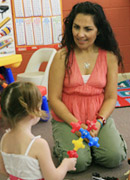Listening
You know that you are really being listened to when you have a person's undivided attention. When someone's whole body and face are directed physically toward you, you know that they want to listen, and that they are listening attentively to you.
Why is it important?
Listening attentively is just as important to children as it is to adults. Children can be very perceptive, and are likely to feel unsettled if they feel you're not interested in what they're saying. This skill can be difficult sometimes, particularly if the children are being very noisy or you've had a busy day - just remember that your priority is always the needs of the children.
How do you listen attentively?
When being attentive you need to be on the child's level. This could mean turning towards them, or squatting or sitting down to be at their eye level. It also involves looking at the child, or being close enough to hear them.
If a child attempts to interrupt you from a conversation you are already having with someone else, you need to acknowledge them in some way, even though it is not appropriate for them to interrupt. Politely excuse yourself for a moment, and acknowledge the child by telling them you will be able to listen to them after you have finished listening to the other person. This is good
role modelling of communication skills.
When new children enrol at the centre, you need to find out if their family have any cultural or other beliefs that you will need to consider when communicating with them. For example, in some cultures it is not appropriate to look into a person's eyes.
Reflect on the last time one of your friends said they were listening to you, but you could tell that they weren't. How did you know they weren't listening? How did it make you feel?
Write your thoughts in your notebook.
How can child care staff build children’s self esteem and confidence just through listening to what they have to say?
Record your response in your notebook.




